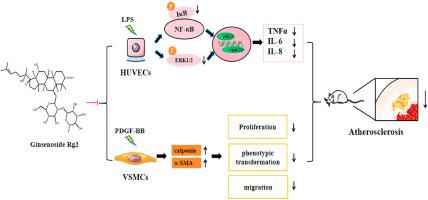Journal of Ginseng Research ( IF 6.8 ) Pub Date : 2022-08-06 , DOI: 10.1016/j.jgr.2022.08.001 Qianqian Xue 1 , Tao Yu 2, 3 , Zhibin Wang 3 , Xiuxiu Fu 3 , Xiaoxin Li 2 , Lu Zou 2 , Min Li 2 , Jae Youl Cho 4 , Yanyan Yang 5

|
Background
Ginsenoside Rg2 (Rg2) has a variety of pharmacological activities and provides benefits during inflammation, cancer, and other diseases. However, there are no reports about the relationship between Rg2 and atherosclerosis.
Methods
We used 3-(4,5-dimethylthiazol-2-yl)-2,5-diphenyltetrazolium bromide (MTT) to detect the cell viability of Rg2 in vascular smooth muscle cells (VSMCs) and human umbilical vein endothelial cells (HUVECs). The expression of inflammatory factors in HUVECs and the expression of phenotypic transformation-related marker in VSMCs were detected at mRNA levels. Western blot method was used to detect the expression of inflammation pathways and the expression of phenotypic transformation at the protein levels. The rat carotid balloon injury model was performed to explore the effect of Rg2 on inflammation and phenotypic transformation in vivo.
Results
Rg2 decreased the expression of inflammatory factors induced by lipopolysaccharide in HUVECs–without affecting cell viability. These events depend on the blocking regulation of NF-κB and p-ERK signaling pathway. In VSMCs, Rg2 can inhibit the proliferation, migration, and phenotypic transformation of VSMCs induced by platelet derived growth factor-BB (PDGF-BB)–which may contribute to its anti-atherosclerotic role. In rats with carotid balloon injury, Rg2 can reduce intimal proliferation after injury, regulate the inflammatory pathway to reduce inflammatory response, and also suppress the phenotypic transformation of VSMCs.
Conclusion
These results suggest that Rg2 can exert its anti-atherosclerotic effect at the cellular level and animal level, which provides a more sufficient basis for ginseng as a functional dietary regulator.
中文翻译:

人参皂苷Rg2对动脉粥样硬化的保护作用及机制
背景
人参皂苷 Rg2 (Rg2) 具有多种药理活性,可在炎症、癌症和其他疾病中发挥作用。但目前还没有关于Rg2与动脉粥样硬化关系的报道。
方法
我们使用 3-(4,5-二甲基噻唑-2-基)-2,5-二苯基溴化四唑 (MTT) 来检测 Rg2 在血管平滑肌细胞 (VSMC) 和人脐静脉内皮细胞 (HUVEC) 中的细胞活力。在mRNA水平上检测HUVECs中炎症因子的表达和VSMCs中表型转化相关标志物的表达。采用Western blot方法在蛋白水平检测炎症通路的表达和表型转化的表达。通过大鼠颈动脉球囊损伤模型,探讨Rg2对体内炎症和表型转化的影响。
结果
Rg2 降低了 HUVEC 中脂多糖诱导的炎症因子的表达——而不影响细胞活力。这些事件取决于 NF-κB 和 p-ERK 信号通路的阻断调节。在 VSMC 中,Rg2 可以抑制由血小板衍生生长因子-BB (PDGF-BB) 诱导的 VSMC 的增殖、迁移和表型转化,这可能有助于其抗动脉粥样硬化作用。在大鼠颈动脉球囊损伤中,Rg2可减少损伤后内膜增生,调节炎症通路以减轻炎症反应,同时抑制VSMCs的表型转化。
结论
这些结果表明Rg2可以在细胞水平和动物水平发挥其抗动脉粥样硬化作用,为人参作为功能性膳食调节剂提供了更充分的依据。































 京公网安备 11010802027423号
京公网安备 11010802027423号